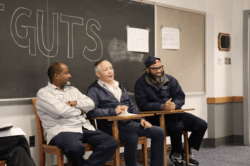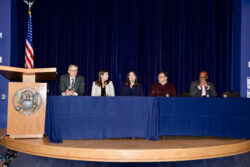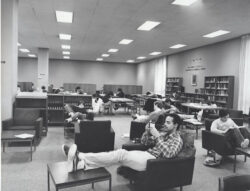The Interdisciplinary Program in Neuroscience (IPN) is one of the success stories of Georgetown’s increased focus on the natural sciences. An obscurity only a few years ago, the Ph.D. program has vaulted itself into the number 14 slot in the National Academy of Sciences’ rankings of neuroscience programs in the U.S. But, even with the presence of a undergraduate neurobiology major at the university, only a precious few Hoyas apply to further their education in the IPN.
“For whatever reason, we have almost no Georgetown undergraduates who apply for our program,” said Bill Rebeck, director of the IPN. This might seem strange, considering the unique advantages that Georgetown undergraduate students in the sciences have. Most notable of these is the presence of Georgetown’s medical center. Not only do Georgetown undergrads have easy access to the medical center building, they also are able to interact with medical and graduate programs in ways that students at other universities cannot.
According to Rebeck, undergraduate students who have an interest in neurobiology can “take the courses that the school offers, but then they run out. And so some of them come over to the medical center to take courses with our graduate students.” In addition to coursework, undergraduate students are given the opportunity to work in labs with faculty members. “My lab right now has six undergraduate students, who end up working in our lab for a number of years.”
That access to research experience is invaluable. Undergrads can leverage that environment to jump into projects usually not available to students their age. “The best experiences are the ones that lead to a publication,” said Rebeck, “and so if you have labs that are publishing papers and an undergraduate can contribute in such a way that they become the middle author on a paper in a journal, that makes a real impression on graduate programs that are looking at that application.”
Recent neurobiology graduate Colin Soper (COL ’12) is continuing to work at the lab where he researched as an undergraduate, getting experience he hopes will help his graduate applications.
“I’m going to start looking at grad schools after a couple years of working and try to get a Ph. D in neuroscience,” Soper said. He claims neurobiology grads are continuing to work in the field, even if they don’t apply to the IPN right away. “I know at least one other person in my year is also working in a lab, one is in grad school at Columbia, everyone is still pursuing neuroscience in an academic setting,” he said.
Soper and Rebeck hope the new Regents Hall will expand the neurobiology undergrad program, which graduated seven students last year. “I think [the new science center] will attract better undergraduates,” Rebeck said. “Some of them will end up in our labs, some of them might decide to apply for programs here, some of our graduate students go to labs over there.” In his eyes, the upgrade was long overdue. “Reiss is like a high school science lab,” Rebeck said. “It’s really shocking.”
Soper echoed the IPN director, saying Regents Hall would add to Georgetown’s already impressive science infrastructure, which includes a hospital, two research buildings, and one of the premiere cancer research facilities in the nation.
“We have a lot of good science going on at Georgetown, it’s just tucked away behind Kehoe, and most people don’t realize it” Soper said. “I think with [Regents] people are going to start to realize more how much we have to offer, and I think once more people hear about the neuroscience program and get into the neuroscience program, they’re going to realize how awesome it is.”
But as awesome as Georgetown’s neuroscience programs may be, they remain miniscule compared to other majors and graduate departments. Rebeck says some of this is built into the discipline.
“It’s not like there are that many kids who want to go to graduate school in neuroscience, and we usually only accept 8 or 10 kids a year,” he said. “It’s not like the medical school where they have a class of nearly 200. A lot of them can come from Georgetown and you can still have a very diverse population. It’s not like that in graduate school—you only accept small numbers.”
And although he would welcome more applications from Georgetown, the IPN head said he wouldn’t necessarily suggest Hoyas list his program as their top choice.
“One of the things that you’ll discover as you go through these moments in your life is that you only have so many of them,” Rebeck said. “You go to college somewhere, maybe you work for a few years after college somewhere, and maybe you go to graduate school somewhere, and then you get that first job somewhere and after a while you run out of changes. You might get 4 or 5 places in your life where you really feel connected to a place … I like to encourage kids to go someplace new.”





My son is double majoring in nueros ience,he thought,and linguistics. He wants to be a neuroscientist and do research. Ive let him handle,along with his dean,the selection of majors and classes thinking he was on track for a degree in neuroscience. His degree status on his myaccess shows him on track for a degree in linguistics and psychology. He is a rising junior. Is a psychology undergraduate degree going to get him into a good grad school for neuroscience and if not is it too late to change his major to neurobiology?Be makes the deans list every semester and currently carries just short of a 3.6 GPA.